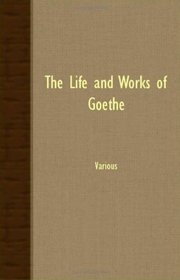Search -
THE LIFE AND WORKS OF GOETHE
THE LIFE AND WORKS OF GOETHE
Author:
THE LIFE AND WORKS OF GOETHE -- INTRODUCTION BY HAVELOCK ELLIS - 1908 - INTRODUCTION - LEWESS Lzye of GoeUe was almost the first to be written, and in essentials it is still perhaps the best. For a long time it was the popular biography even in Germany, where now, however, it has been superseded by Bielschowskys Goetke, a valuable work undoubted... more »
Author:
THE LIFE AND WORKS OF GOETHE -- INTRODUCTION BY HAVELOCK ELLIS - 1908 - INTRODUCTION - LEWESS Lzye of GoeUe was almost the first to be written, and in essentials it is still perhaps the best. For a long time it was the popular biography even in Germany, where now, however, it has been superseded by Bielschowskys Goetke, a valuable work undoubted... more »
ISBN-13: 9781408630631
ISBN-10: 140863063X
Publication Date: 10/26/2007
Pages: 636
Rating: ?
ISBN-10: 140863063X
Publication Date: 10/26/2007
Pages: 636
Rating: ?
0 stars, based on 0 rating




